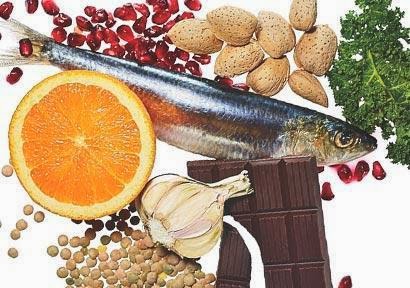
Heart disease may be a leading cause of death, but that doesn't mean you have to accept it as your fate. Although you lack the power to change some risk factors such as family history, love or age — there are some key heart disease prevention steps you can take.
You can avoid heart problems in the future by adopting a healthy lifestyle today and by eating some right kinds of foods. Here are some best natural tips and heart disease preventions to prevent Heart Attacks and many other heart problems.
11. Best Foods and Tips To Prevent Heart Attacks
1. Salmon

Salmon and other fatty fish such as sardines and mackerel are the superstars of heart-healthy foods. That's because they contain copious amounts of omega-3 fatty acids, shown in studies to lower the risk of arrhythmia (irregular heart beat) and atherosclerosis (plaque build-up in the arteries) and decrease triglycerides. The American Heart Association recommends eating fish and preferably fatty fish at least twice a week. Omega-3 fatty acids are also available as dietary supplements.
2. Legumes

Legumes, such as pinto, black and kidney beans, chickpeas and lentils, are low-fat, high fiber protein sources . They are cholesterol-free, vitamin-rich and contain minerals, such as calcium. Tofu and other soy products -- edamame, veggie burgers, soy milk and tempeh -- are lean protein sources, and eating them for snacks or meals may lower LDL cholesterol and reduce your risk of cardiovascular disease.
3. Some Vegetables oils

such as corn, soy and safflower, which contain omega-6 fatty acids, and those containing omega-3 fatty acids such as canola and olive oil. All of these can help to lower LDL cholesterol when used instead of saturated fats such as butter
4. Nuts

Nuts are chock-full of vitamins, minerals, heart-healthy monounsaturated fats and low levels of saturated fats. Research suggests that people who eat nuts—walnuts, pecans, almonds, hazelnuts, pistachios, pine nuts and peanuts (which actually are legumes)—two to four days or more per week have a lower incidence of heart disease than people who eat them less often.
5. Oatmeal

Oatmeal is high in soluble fiber, which can lower cholesterol. "It acts as a sponge in the digestive tract and soaks up the cholesterol so it is eliminated from the body and not absorbed into the bloodstream," says Lauren Graf, a registered dietician and co-director of the Cardiac Wellness Program at Montefiore Medical Center in New York City. Graf recommends avoiding instant oatmeal, which often contains sugar, and heading instead for old-fashioned or even quick-cooking oats. Other whole grains such as bread, pasta and grits are also good for the heart as long as they still contain the entire grain.
6. Soy Milk

It's high in the organic compound isoflavones, which has been shown to help reduce cholesterol. Unlike animal milk, this beverage contains no cholesterol and is naturally low in fat. In also contains niacin, which helps boost circulation.
7. Beans

Beans, such as kidney beans, lima beans, and black beans, have several health benefits. They are high in fiber, potassium and folate. The fiber will help you feel full and satisfied and will lower cholesterol. Potassium is necessary to keep the heart muscle beating strongly and regularly. Folate breaks down certain amino acids that have been found to increase the risk of heart disease. Add some beans a salad, or use them as a side dish for dinner. Eat them several times a week to keep a healthy heart.
8. Raisins

Research has shown that antioxidants in raisins fight the growth of a type of bacteria that can cause inflammation and gum disease. People with gum disease—which affects up to 50 percent of American adults—are twice as likely to suffer from heart problems. So, dealing with one can help people avoid the other. Last summer, a major heart journal and a major periodontal journal simultaneously published a consensus paper that outlines the link between the two diseases: inflammation. As a result, choosing certain foods, such as raisins, may help you protect both your gums and your heart.
9. Blueberries

Not just blueberries, but strawberries and other berries as well. According to one recent study, women aged 25 through 42 who ate more than three servings of blueberries and strawberries a week had a 32% lower risk of heart attack compared with those who ate less. The authors of the study attributed the benefit to compounds known as anthocyanins, flavonoids (which are antioxidants) that may decrease blood pressure and dilate blood vessels. Anthocyanins give plants their red and blue colors.
10. Avocado oil

Pressed from the fruit, avocado oil has been touted as a more heart-healthy cooking oil because of its ability to modify fatty acids in tissues around the heart. A 2005 National Institute of Cardiology study that showed the oil could decrease hardening of the arteries, which often leads to heart disease.
11. Apples

Apples were associated with a lower risk of death from both coronary heart disease and cardiovascular disease in the Iowa Women’s Health Study, which has been tracking 34,000-plus women for nearly 20 years. Finnish researchers studying dietary data collected over 28 years from 9,208 men and women found that frequent apple eaters had the lowest risk of suffering strokes compared with nonapple eaters. What explains the hearty benefits? Researchers suggest that the strong antioxidant flavonoid compounds found in apples—quercetin, epicatechin, epigallocatechin, kaempferol and other polysyllabic wonders—play a key role by preventing “bad” LDL cholesterol from oxidizing and triggering a series of events that result in the buildup of plaque in arteries, as well as inhibiting inflammation. Apples are also rich in pectin, a form of soluble fiber known to help lower cholesterol, and they provide a decent amount of vitamin C, another antioxidant.
